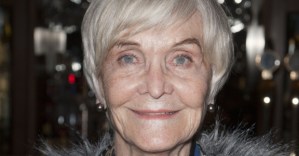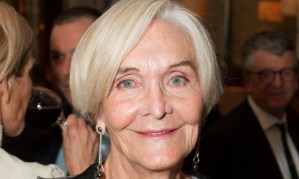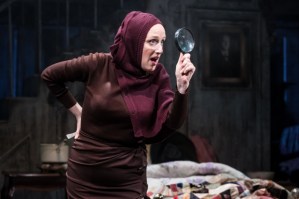Review: Harold and Maude (Charing Cross Theatre)
Sheila Hancock stars in the adaptation of the 1971 film
What a strange play this is! Adapted by Colin Higgins from his screenplay from the 1971 film, it is an odd slice of whimsy which simultaneously satirises the beliefs and lifestyle of the time and celebrates its quirkiness.
I can’t help feeling that the only possible reason director Thom Southerland could have chosen to revive it now, was to give the 85 year-old Sheila Hancock the starring role of 79 year-old Maude. If so, that was an excellent choice. She doesn’t disappoint, producing a performance of real class and great grace that elevates what is essentially a slight piece into something more interesting.
She’s one half of the ultimate odd couple, forging a friendship with 19 year-old Harold, a teenage misfit who is obsessed with death, spending his days staging dramatic suicides in order to get his mother’s attention. Unfortunately, he does this so often that she ignores him – as we see in the first scene, where she entirely disregards his limply hanging body (and his suicide note) while giving instructions to the new maid.
Harold and Maude both enjoy attending a funeral, which is where they meet. Maude, an Austrian countess, still glamorous in autumn-coloured velvets, accessorised with yellow clogs, immediately enfolds him in her unique worldview, complaining about the darkness of the crucifixions that surround them. "You’d think they’d never read the end of the story," she complains.
Hancock, her voice impeccably redolent of her homeland, makes the words sound enticing. And sure enough. Harold (Bill Milner) overcomes his initial wariness of this eccentric figure who steals cars and liberates seals from the zoo and embraces her upbeat philosophy of life. "Start each day with something new. That’s my motto," she says, encouraging him to fire up the hookah on the grounds that it must be all right because it’s "organic".
Darker shades lurk, amidst the fun. Maude’s tragic background of camps and guards is lightly sketched; her determination to die on her 80th birthday is signalled from the start. Her liberation, her seizing of the moment stands in stark contrast to the forces of authority (the church, the police, the state, the family) that surround her.
All this is deftly drawn in Southerland’s production. It struggles sometimes to find the exact tone and the precise view of its characters, but Francis O’Connor’s stark set, which changes its mood according to Matt Clutterham’s lighting – dead whites for Harold’s home, rosy pink for Maude’s, gentle green for a trip to a forest – contains the action beautifully. Jonathan Lipman provides appropriate period costumes, so plush you want to touch them.
But though the device of having the supporting cast on stage throughout, playing musical interludes and sounds, is effective in some scenes, it clutters the space when you want to concentrate on the developing relationship between the two protagonists.
Despite this, Milner and Hancock achieve a gentle, tender rapport. His delivery is sometimes very slow – as if it makes the words more meaningful – but he is wonderfully open and responsive, quite convincing both in his despair and his liberation. And she is just lovely; in a rare instance of an octogenarian acting younger, she looks half her age, with a supple glamour and eye-catching charisma. She also manages to make Maude’s platitudinous pronouncements sound profound, bringing warmth and feeling to every word. To complete a fine trio, Rebecca Caine as Harold’s status-obsessed mum is sharply funny and much less caricatured than the script she is working with.
Together they make this weird piece spring to life. Just.
Harold and Maude runs at Charing Cross Theatre until 31 March.
















